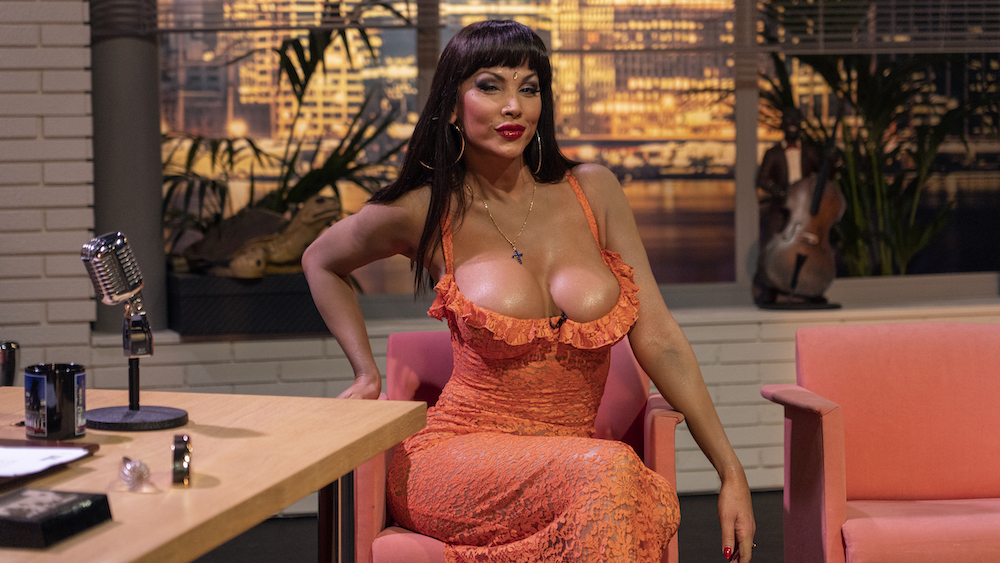Veneno is a bio-drama miniseries from Spain about La Veneno—a trans hooker who was “discovered” by a TV tabloid show in the mid 1990’s and who became a hypersexualized, circus figure on talk shows. For a younger generation of trans women, she was a representational icon at a time where there was no room for anything but ridicule for them in Spanish society. Veneno dramatizes both La Veneno’s life, and the coming out and transition of a young teen fan that idolizes her and with whom La Veneno publishes a memoir, bringing her back to media attention in the weeks before her untimely and mysterious death.

Veneno takes several strains of queer TV/film aesthetics and turns up the volume and executes them very well. Operatic set pieces, bright and postmodern set designs and surreal storytelling devices from gay auteurs like Russel T. Davies, Pedro Almodóvar, and Ryan Murphy mark emotionally important moments in Veneno’s life. There is a commitment to queer actors playing queer parts and incorporating members of the communities depicted on screen, as in queer shows like Vida and Work in Progress. There’s some exploration of how queerness moves around in families across generations from Transparent, and the beautiful rush and heartbreaking pain that comes with depicting mental illness from close up and on the inside from Eurphoria and I May Destroy You. These are my points of reference, all excellent.

Veneno is often beautiful—you can see the set design budget stretched when sets are reused one too many times, but everyone looks great—and there are several moments where costuming choices took my breath away, like when we first see teenage Veneno’s outfit to wear to a village festival. The writing is strong too, although there’s only so much I can say about that given that I am watching in a subtitled translation. Some emotional notes are hit a little too often for me, particularly in montages of the young trans writer, Valeria, gazing adoringly at Veneno, but any bum notes are saved by the incredible talent on screen. Highlights in the cast include Marcos Sotkovszki, Jedet, and Isabel Torres, who all play La Veneno at different ages, Paca la Piraña, Veneno’s longest friend and appearing as herself, Lola Rodriguez playing Veneno’s young disciple Valeria, and Lola Dueñas who plays the amoral TV producer that first finds La Veneno.

Veneno was a charismatic monster to Spanish TV audiences in the 90’s, and she’s a bit of one now. Her understanding of queerness and sexuality, her love of commoditizing and sharing her body, her hunger to be objectified, these are all uncomfortable traits for queer heroes as we round into 2021. We are not supposed to so nakedly hang our self esteem on how we are desired by men. It has taken a whole apparatus of corporate gay organizations to send the message that being queer is not synonymous with risky sex, sex for money, sexual violence, mental illness and drug addiction, but these were all important parts of La Veneno’s story. At the end of her life, all of her friends that loved her wished that she had a different life. We get a sense of the arc of her whole life, how she hungered for safety and love in every chapter of her life. She didn’t often get it, and we have a chance to give her some of that love in death. She made for great television, and it appears that she still does, and we as viewers have to sit with that knowledge too.
other voices
- Mikelle Street for Out “‘Veneno’ — HBO Max’s Sexy, Must-Watch Queer Series — Does Vital Work”
- Drew Gregory for Autostraddle “HBO Max’s “Veneno” is the Television Masterpiece Trans Icon Cristina La Veneno Deserves”
- Norwill Fragoso (Español)
- Pablo Valdiva for Buzzfeed “Veneno” On HBO Max Is Unlike Anything You’ve Seen Before

